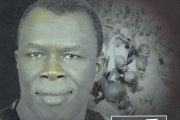By Chijioke Uwasomba, Ph.D
Chinua Achebe’s Things Fall Apart, arguably the foremost classic of African literature is sixty-two years already and has not lost its contemporary relevance in its mirror image of Africa in general and Nigeria in particular. Given its status as a work of pre-eminent literary engagement, the novel was celebrated in all parts of the world when it turned fifty years. Here in Nigeria, one of the leading voices in Achebe school of fiction, Chima Anyadike, led a group of other scholars to organize a deserving celebration of this very important novel at the Obafemi Awolowo University, Ile-Ife. In the foreword to the Book, Blazing the Path: Fifty Years of Things Fall Apart, which was a product of the Ife celebration, co-edited by Chima Anyadike and Kehinde Ayoola, Akinwumi Isola raised the question: “how much of the primary purpose of literature has Things Fall Apart fulfilled?” He provided an answer to his question by not only restricting his response to Things Fall Apart but to what literature does generally. Things Fall Apart like any other piece of literature helps the society to reflect on itself. After all, literature in every material particular is an imitation of life.
Things Fall Apart has enjoyed profound critical attention and will continue for a long time to come because of its high artistic quality and wide audience reception. The novel will continue to enjoy wider readership because its capacity to yield new meanings without limit aimed at explaining and proffering solutions to the African or even at best the human condition. To that extent the scholarship on the novel is guaranteed for ages.
Beyond its colonial contact theme the novel is open to a lot of interpretations with implications for Nigeria. It is true that the novel dwells so much on the devastation suffered by Umuofia as a result of the coming of colonial and imperialist forces, it also ties to show that even if the western forces did not come, the internal contradictions and pressures witnessed in Umuofia would have still led to a fundamental change. Umofia is already sharply and hopelessly divided. The colonial factor was only the tinder that quickened the crisis and the subsequent torpedoing of the Umofia society. Okonkwo, the hero or better still, the anti-hero of the novel has become so much powerful and pig-headed acquiring wives, property of all sizes and shapes, titles, including the commanding heights of the economy and such other enamored positions of his society. Unlike Obierika, his most intimate friend and adviser, Okonkwo is gung-ho in all his activities both at home and outside his house. He does not have respect for others and looks down on quite a lot of people who have not recorded some achievements like him.

Killing Ikemefuna has become the high point of Okonkwo’s character complexity in popular sense of the novel
Okonkwo’s high-handedness is writ large as he treats his house-hold with disrespect. He sees and treats his son, Nwoye with condescension and describes him as effeminate with a tinge of regret that Nwoye is his son. If he had the capacity he would have changed the situation. In his foolish manliness he kills Ikemefuna the lad who had almost become his son having lived for a long time in Okonkwo’s house-hold. He shoots his wife and manifests strong patriarchal tendencies that do not give room for a gendered and equal society.
Ogbuefi Ezeudu, a highly respected titled man had earlier warned Okonkwo against killing Ikemefuna as demanded by the Oracle. But Okonkwo in his fool-hardiness goes against this well-intentioned advice. It can be argued that Okonkwo’s character traits are his undoing and it is not surprising that he crashes himself and the body is allowed to rot in the evil forest. One of the ironies in Achebe’s Thing Fall Apart is that in spite of the status of Okonkwo as a man of great achievement who is an outstanding fellow in the Umofia society, his body is not only abandoned, his acquisitions are also left to rot away b3ecause of the nature of his death. The neglect of the advice that “no man however great is not greater than his people; and that no one ever won judgment against his clan” is not heeded by Okonkwo.
Things Fall Apart also emphasizes the essence of consensus building. Perhaps if there were consensus among the elite of the Umuofia society the defeat would not have occurred the way it did. If there were consensus, Okonkwo would not have on his own acted irrationally, only to discover to his chagrin that his action is not supported by anybody amongst his people. The Umuofia society is a republican society and therefore, is opposed to one-upmanship which is what Okonkwo represents. Achebe through this novel is warning individuals who think that they are greater than the society, to think before they leap, because dire consequences await not only the individuals but the entire society.
Okonkow means well but unfortunately he does not have the requisite character to lead a diverse, complex and sophisticated society like Umuofia. As can be gleaned from the novel, the failure of Umuofia is informed by lack of leadership. In a society that has the likes of Obierika with their reasoned and rational philosophical bearing, men like Okonkwo should have occupied a lesser seat in the leadership recruitment process. The society mirrored like any other one for that matter desires intellectuals of note with leadership skills and correct temperament as opposed to character types of Okonkwo’s hue known for their rashness, insularity, nepotism, inability to manage diversities, jingoists with extreme dictatorial proclivities lacking in depth and statecraft. Good governance in any society comes with frugality, respect for the rule of law, political accommodation and inclusivity, fairness, equity and national development. It is important to note when a society is in the hands of the Okonkwos, there cannot be progress.
Achebe, through the novel is warning his readers that leadership is the bane of society and this is observable more in neo-colonial and dependent economies like Nigeria. Given Achebe’s deep vision, it cannot be dismissed if one argues that, Achebe, apparently realizing that perhaps, since most Nigerians might not have untangled the metaphoric essence of Things Fall Apart, decided to write a political pamphlet, The Trouble With Nigeria in which he states that “the trouble with Nigeria is simply and squarely a failure of leadership…”
Uwasomba, the author, teaches in the Department of English, Obafemi Awolowo University, Ile-Ife, Nigeria.




























